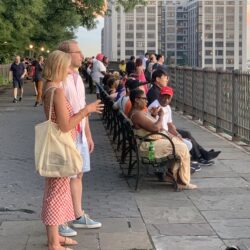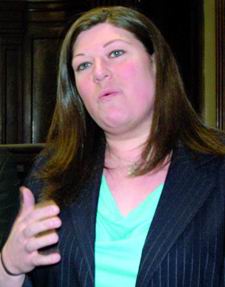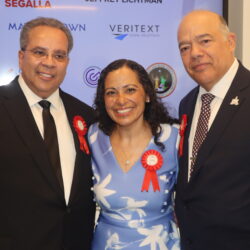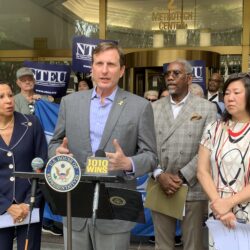
Barclays Arena Liquor License Meeting: Many Jeers, Few ‘Cheers’

By Raanan Geberer
Brooklyn Daily Eagle
BROOKLYN — A joint meeting of committees from community boards 2 and 6 that convened Tuesday night to consider a request for a liquor license for the Barclays Center ended up with two different votes.
The CB2 committee approved the liquor license with several conditions, but the CB6 group voted to table the application until arena management appoints a community advisory committee to address residents’ concerns.
The final decision on granting a license to concessionaire Levy Food Service will be made by the State Liquor Authority in Albany. But the meeting showed that the old anti-Atlantic Yards crowd is as vociferous, and as suspicious of the project, as ever.
And it also showed that residents of nearby blocks are still haunted by the specter of drunk, rowdy fans exiting the arena, yelling loudly, throwing garbage into the streets, urinating publicly and defacing property.
The meeting began with a presentation by Julia Margolin, director of operations at Barclays Arena for Levy; Robert Skene, the firm’s attorney; and David Anderson, vice president of event and guest services for AEG Facilities, security consultant for the arena. Both Margolin and Anderson stressed that they now lived in Brooklyn.
By and large, the team appeared very professional, emphasizing the large number of major arenas and stadiums throughout the U.S. and Canada that each organization has handled.
Skene said that most of the 57 “points of sale” within the arena that would sell liquor would have a menu of pizza, hot dogs, nachos and similar food. Of those 57 sales locations, 27 would sell beer only, and the rest would sell beer, liquor and wine. They would stop selling alcoholic beverages at the end of the third quarter and there would be a two-drink-per-person rule, both of which are standard in the NBA.
However, he also said that there would be “hawkers” throughout the arena, walking around and selling beer. This turned out to be a sticky point, especially when he said the firm hadn’t decided how many they would employ.
Another problematic issue arose when an audience member asked whether the organization would use special card-readers to check young people’s IDs, since these readers can presumably recognize fake IDs. Margolin answered in the negative, saying that “the machines can also lie,” and that the employees would be trained to look carefully at IDs.
Later, an audience member who owns a nightclub said that when the city’s Cabaret Squad visited him, an official acted relieved when the club owner told him he uses the card-readers.
The time when sales of alcohol would end also proved problematic. Several audience members pointed out that not only basketball games would take place at the arena — concerts would, too.
Anderson said that in his experience, arena management gets together with artists’ management and knows in advance about when a concert will end, then stops selling liquor about an hour beforehand. He estimated that most concerts will end around 11 p.m.
One audience member objected that concerts by big-name artists such as Prince or Bruce Springsteen can go on until 1 or 2 a.m., but Anderson replied that this is the exception, not the rule.
Toward the beginning of the meeting, Anderson, citing his experience at the United Center in Chicago, assured the crowd that security officers and off-duty police officers will be posted throughout the arena during events.
But when the public comment period began, several representatives of neighorhood organizations, including Peter Krashes of the Dean Street Block Association and Gib Veconi of the Prospect Heights Neighborhood Development Council, asked about how security would be handled in the blocks around the arena after events, not to mention at nearby subway stations.
NYPD Inspector Terrance Riley, who was at the meeting, said that efforts are being coordinated between different precincts and the Transit Police.
Veconi criticized Forest City Ratner, developer of the Arena, Levy and AEG for formulating their plans without going to the community first. Citing the history of bad blood between Forest City Ratner and many elements of the surrounding community, he called for the appointment of a community advisory board to address security and other concerns.
The loudest applause was given to Councilwoman Letitia James, a longtime foe of Atlantic Yards, who called for a moratorium on a liquor license because so many issues have still not been resolved — including which precinct will be responsible for arena security.
“I don’t see how I can be responsible, and stand up and say I am doing my job in the absence of knowing this community will be safe,” she said.
While several audience members, including a representative from the Brooklyn Chamber of Commerce and a local restaurateur, spoke in favor of giving the Barclays Center a liquor license because of the economic boom the arena would create in nearby areas, critics of the arena were more warmly received by the audience.
The meeting took place at the 78th Precinct House and was presided over by Board 2’s Gary Reilly.
Leave a Comment
Leave a Comment




